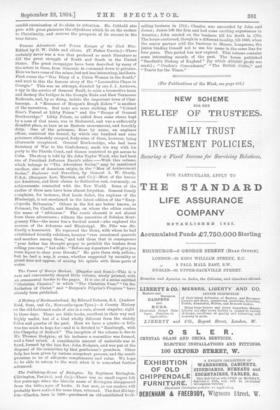Famous Adventures and Prison Escapes of the Civil War. Edited
by G. W. Cable and others. (T. Fisher Unwin.)—There
certainly never was a war that produced so much literature as did the great struggle of North and South in the United
States. The great campaigns have been described by many of the actors in them, from Generals in command down to privates. Here we have some of the minor, but not less interesting, incidents. First comes the "War Diary of a Union Woman in the South," and next to this the famous story of the "Locomotive Chase in Georgia." This was an attempt, directed by one J. J. Andrews, a spy in the service of General Buell, to seize a locomotive train and destroy the bridges in the Georgia State and East Tennessee Railroads, and, by so doing, isolate the important town of Chat- tanooga. A "Romance of Morgan's Rough Riders" is another of the narratives. But none are more striking than "Colonel Rose's Tunnel at Libby Prison" and the "Escape of General Breckenridge," Libby Prison, so called from some stores kept by a man of that name, was in Richmond, and was a sufficiently dreadful place, as bare as an Eastern caravanserai, and horribly dirty. One of the prisoners, Rose by name, an engineer officer, contrived the tunnel, by which one hundred and nine prisoners ultimately escaped, forty-nine of them, however, being afterwards recaptured. General Breckenridge, who had been Secretary of War to the Confederacy, made his way with his party to the Florida Coast, and thence contrived to get across to Cuba. The story is told by Mr. John Taylor Wood, who had been one of President Jefferson Davis's aides.--With this volume, which belongs to " The Adventure Series," may be mentioned another, also of American origin, in the " Men of Achievement Series," Explorers and Travellers, by General A. W. Greely, U.S.A. (Sampson Low, Marston, and Co.)—Most of the heroes are American, and their claims to distinction rest, commonly, on achievements connected with the New World. Some of the earlier of these men have been almost forgotten. General Greely complains, for instance, that Louis Soliet, the explorer of the Mississippi, is not mentioned in the latest edition of the "Ency- clopmdia Britannica." Others in the list are better known, as Fia'enont, Du Chaillu, and Stanley, on whom the editor confers the name of " Africanus." The comic element is not absent from these adventures ; witness the narrative of Zebulon Mont- gomery Pike—the name has a farCical sound—who explored the sources of the Arkansas and Mississippi. Mr. Pike was dis- tinctly a humourist. He reproved the Sioux, with whom he had established friendly relations, because "rum occasioned quarrels and murders among them," and told them that in consequence " your father has thought proper to prohibit the traders from Belling you rum ; " but adds : "Before my departure I will give you some liquor to clear your throats." He gave them gay gallons ; but he had a way, it seems, whether suggested by morality or greed does not appear, of mixing his spirits with three parts of water.


































 Previous page
Previous page